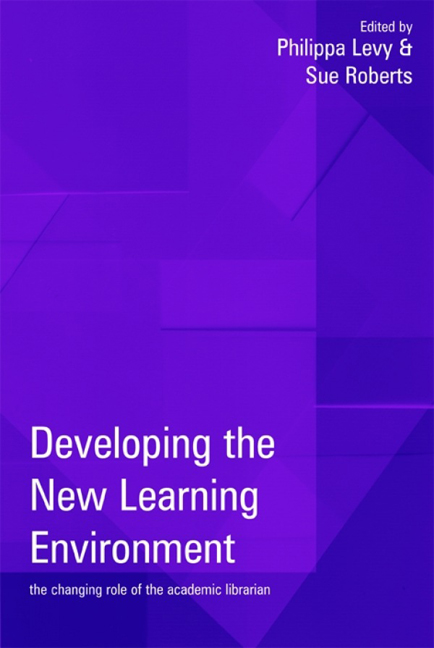Book contents
- Frontmatter
- Contents
- The editors and contributors
- Introduction: the challenge for the academic librarian
- Part 1 Perspectives on the policy framework
- Part 2 Policy into practice
- 6 New academic teams
- 7 Responding to the e-learning imperative
- 8 Information literacy education in practice
- 9 The inclusion agenda and its impact on practice
- 10 A kaleidoscope of change: how library management can support the development of new learning environments
- Part 3 Reflections
- Index
8 - Information literacy education in practice
from Part 2 - Policy into practice
Published online by Cambridge University Press: 08 June 2018
- Frontmatter
- Contents
- The editors and contributors
- Introduction: the challenge for the academic librarian
- Part 1 Perspectives on the policy framework
- Part 2 Policy into practice
- 6 New academic teams
- 7 Responding to the e-learning imperative
- 8 Information literacy education in practice
- 9 The inclusion agenda and its impact on practice
- 10 A kaleidoscope of change: how library management can support the development of new learning environments
- Part 3 Reflections
- Index
Summary
In this chapter, Judy Peacock argues passionately for librarians to become centrally involved in innovative pedagogical development in the e-learning context, through their role as information literacy educators. Writing from an Australian perspective, she emphasizes the need for information literacy development to become deeply embedded into the student experience of higher education, and for technologyenhanced approaches to information literacy curriculum design to be pedagogically, not technologically, driven. Like other chapters, and reflecting leading-edge work in this area at Queensland University of Technology (QUT), she emphasizes librarians’ involvement in educational policy and strategy at institutional level, in forging new, inter-professional partnerships, and in professional development for teaching and the facilitation of learning. The chapter provides a case example from QUT of a broad strategic framework for technology-enhanced pedagogical development of information literacy, and of the design and development of a fully online information literacy course for higher degree students.
Introduction
Global war is afoot. The basis, however, is neither religion nor territory, ethnicity nor prosperity. It is, quite simply, pedagogy. More precisely, it is a conf lict between pedagogists and technologists as each camp battles for supremacy over the art and science of teaching and learning in a new age. Unfortunately, as with most wars, there is collateral damage – in this tacit dispute, the learner is the innocent at risk.
Librarians hold an enviable position in this conflict. A degree of neutrality affords librarians the advantage of seeing all perspectives, ref lecting on all arguments and working in both camps. With information literacy as a catalyst for engagement, and as sophisticated and proficient users of information and information and communication technologies (ICTs), librarians have a unique opportunity to provide practical and enduring solutions to complex curricular problems, resolve pedagogical and technological tensions and partner with their academic colleagues to achieve educational nirvana. In a teaching world gone technologically mad, librarians can provide a balanced and discriminating view of the place of ICT in education (Bundy, 1999), seeking – ultimately – to place the learner and learning outcomes at the forefront of each educational strategy and to inject a sense of balance into their own practice as educators.
- Type
- Chapter
- Information
- Developing the New Learning EnvironmentThe changing role of the academic librarian, pp. 153 - 180Publisher: FacetPrint publication year: 2005
- 3
- Cited by



